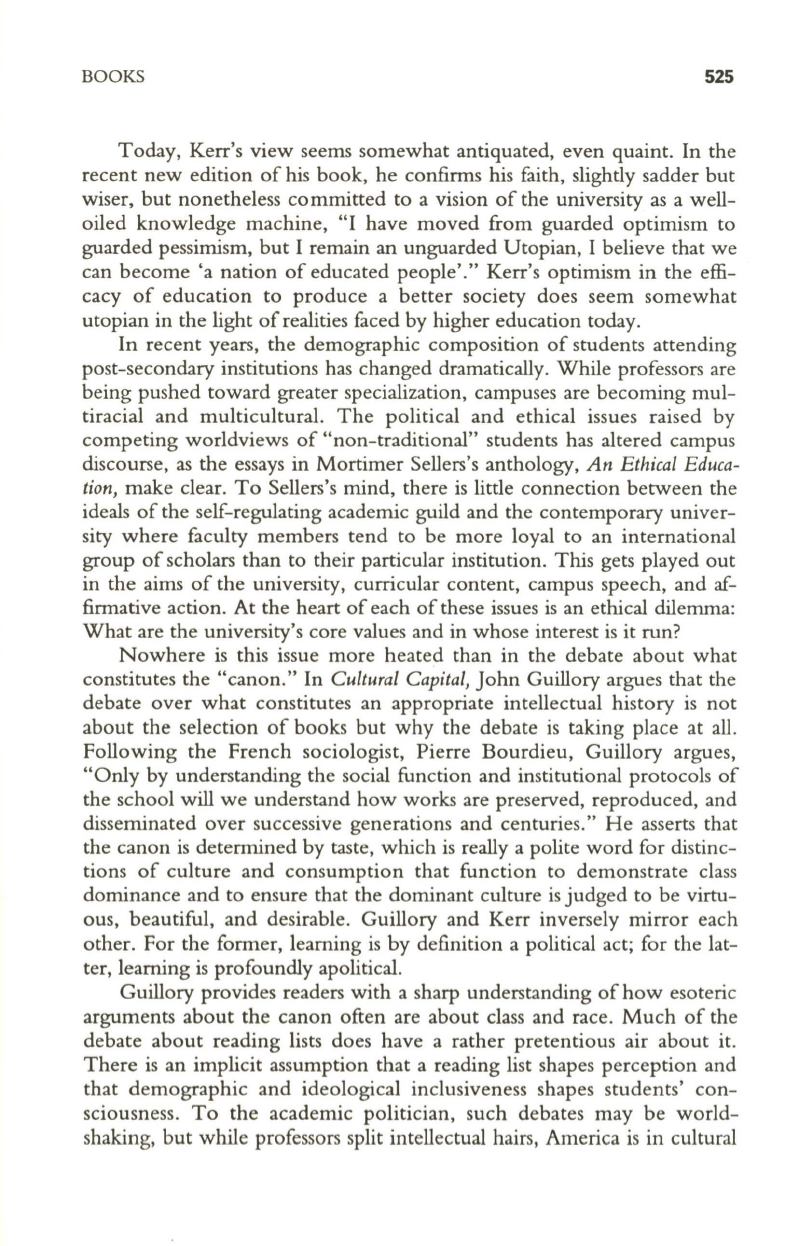
BOOKS
525
Today, Kerr's view seems somewhat antiquated, even quaint. In the
recent new edition of his book, he confirms his faith, slightly sadder but
wiser, but nonetheless committed to a vision of the university as a well–
oiled knowledge machine, "I have moved from guarded optimism to
guarded pessimism, but I remain an unguarded Utopian, I believe that we
can become 'a nation of educated people'." Kerr's optimism in the effi–
cacy of education to produce a better society does seem somewhat
utopian in the light of realities faced by higher education today.
In recent years, the demographic composition of students attending
post-secondary institutions has changed dramatically. While professors are
being pushed toward greater specialization, campuses are becoming mul–
tiracial and multicultural. The political and ethical issues raised by
competing worldviews of "non-traditional" students has altered campus
discourse, as the essays in Mortimer Sellers's anthology,
An Ethical Educa–
tion,
make clear. To Sellers's mind, there is little connection between the
ideals of the self-regulating academic guild and the contemporary univer–
sity where faculty members tend to be more loyal to an international
group of scholars than to their particular institution. This gets played out
in the aims of the university, curricular content, campus speech, and
af–
firmative action. At the heart of each of these issues is an ethical dilemma:
What are the university's core values and in whose interest is it run?
Nowhere is this issue more heated than in the debate about what
constitutes the "canon." In
Cultural Capital,
John Guillory argues that the
debate over what constitutes an appropriate intellectual history is not
about the selection of books but why the debate is taking place at all.
Following the French sociologist, Pierre Bourdieu, Guillory argues,
"Only by understanding the social function and institutional protocols of
the school will we understand how works are preserved, reproduced, and
disseminated over successive generations and centuries." He asserts that
the canon is determined by taste, which is really a polite word for distinc–
tions of culture and consumption that function to demonstrate class
dominance and to ensure that the dominant culture is judged to be virtu–
ous, beautiful, and desirable. Guillory and Kerr inversely mirror each
other. For the former, learning is by definition a political act; for the lat–
ter, learning is profoundly apolitical.
Guillory provides readers with a sharp understanding of how esoteric
arguments about the canon often are about class and race. Much of the
debate about reading lists does have a rather pretentious air about it.
There is an implicit assumption that a reading list shapes perception and
that demographic and ideological inclusiveness shapes students' con–
sciousness. To the academic politician, such debates may be world–
shaking, but while professors split intellectual hairs, America is in cultural


